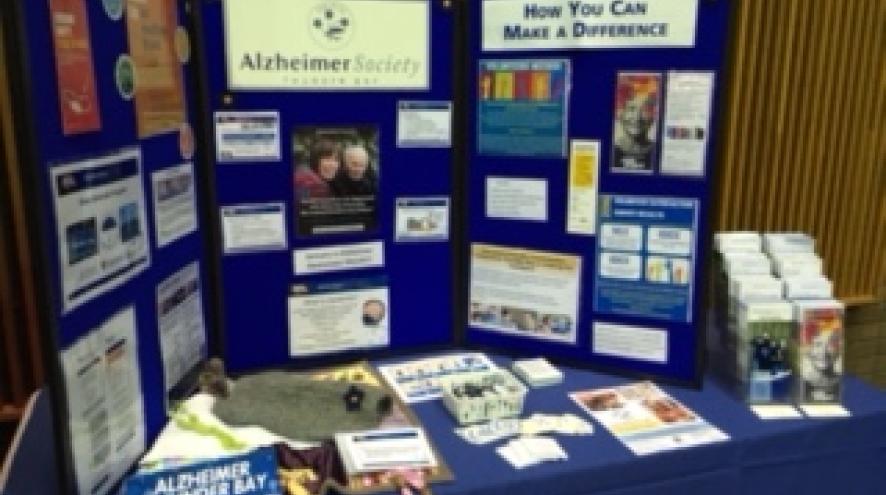(French) Dementia education in Thunder Bay
The Alzheimer Society of Thunder Bay provides many educational opportunities for people living with Alzheimer’s disease and other dementias, caregivers and healthcare providers.

Contact
Kara Kruk
Public Education Coordinator, Alzheimer Society of Thunder Bay
Phone: 807-345-9556 ext. 2010
Email: [email protected]
Types of education sessions
We provide many educational opportunities for individuals living with dementia, caregivers, health care professionals, community agencies, scheduled training for long-term care staff, and the general public. Education can be tailored to specific groups or topics, to ensure the information or training fits our needs! Education sessions we currently provide include:
- U-First!: a simple and affordable training program in dementia care for healthcare professionals. Based of the P.I.E.C.E.S™ best practice methods, we teach you how to see the whole person behind the disease so you can understand the root of behaviours. After completing six hours of training, you will receive a certificate in dementia care proving you have been trained in the highest standards as mandated by the province of Ontario.
- Heads Up For Healthier Brains: what everyone should know about brain health and dementia, surrounding reducing your risk by taking action for a healthier brain.
- Finding Your Way: helps people living with dementia, their families, caregivers and communities to recognize the risk of going missing, be prepared for incidents of going missing, and ensure that people with dementia can live safely in the community.
- What is dementia: information session on dementia that covers what dementia is, the A's of dementia, and how to effectively communicate with a person living with dementia.
- Online Resources: we offer suggestions for devices and products to assist with wandering and safety, such as Alzstore.ca or Medic Alert® Safely Home®. We also offer self-learning online modules surrounding dementia at alzeducate.ca
Education events
Each year the Alzheimer Society of Thunder Bay holds a Dementia Care Conference and/or workshops for professional and non-professional care partners. Stay tuned for upcoming events!
Dementia fact or fiction
Over the years, many myths have evolved about what Alzheimer’s disease is, who gets it and how it affects people who have it. These myths can add to the stigma attached to the disease and stand in the way of our ability to understand and help people with it. At the Alzheimer Society, we believe the sooner we dispel the myths, the better we’ll be able to respond to the reality.
FACT OR FICTION: My mother had Alzheimer’s, so I’m going to get it too.
FICTION! Although genetics play a role in the disease, fewer than seven per cent of cases are associated with genes that cause the early onset inherited familial form of the disease (FAD). The majority of cases are of the late onset “sporadic Alzheimer’s disease” form, in which genes do not play a role. A person who has a parent or a sibling who has or had sporadic Alzheimer’s disease has a very slightly increased risk of getting the disease.
FACT OR FICTION: Alzheimer's only affects the elderly.
FICTION! While age is the most significant known risk factor for Alzheimer’s disease, most people in fact do not develop the disease as they age. However, even with the sporadic form of the disease, people have on occasion been diagnosed with it in their 40s and 50s. What’s most important to understand is that Alzheimer’s disease is not a normal part of aging.
FACT OR FICTION: There’s no cure for Alzheimer’s disease.
FACT! At present there is no cure for Alzheimer’s disease, but there are medications and other approaches that, in the first few years, can often successfully help with some of the symptoms and improve quality of life. The good news is that researchers have made great strides and there are a number of drugs in clinical trials that act directly against the disease process.
FACT OR FICTION: If I’m diagnosed with Alzheimer’s disease, it means my life is over.
FICTION! Many people with the disease live meaningful active lives for quite a number of years. They have a sense of purpose and do not feel their lives are over. Research indicates that making healthy lifestyle choices can help to slow the progression of the disease. Earlier diagnosis and medications are helping. It is also important to have access to services and activities for people with the disease to optimize their quality of life.
FACT OR FICTION: If I start to forget things it means I have Alzheimer’s disease.
FICTION! Many people have trouble with their memory as they get older, but that in itself does not mean they have Alzheimer’s disease. When memory loss affects day-to-day function, and especially when this is coupled with lack of judgment and reasoning, or changes in communication abilities, it’s best to visit a doctor to determine the cause of the symptoms.
